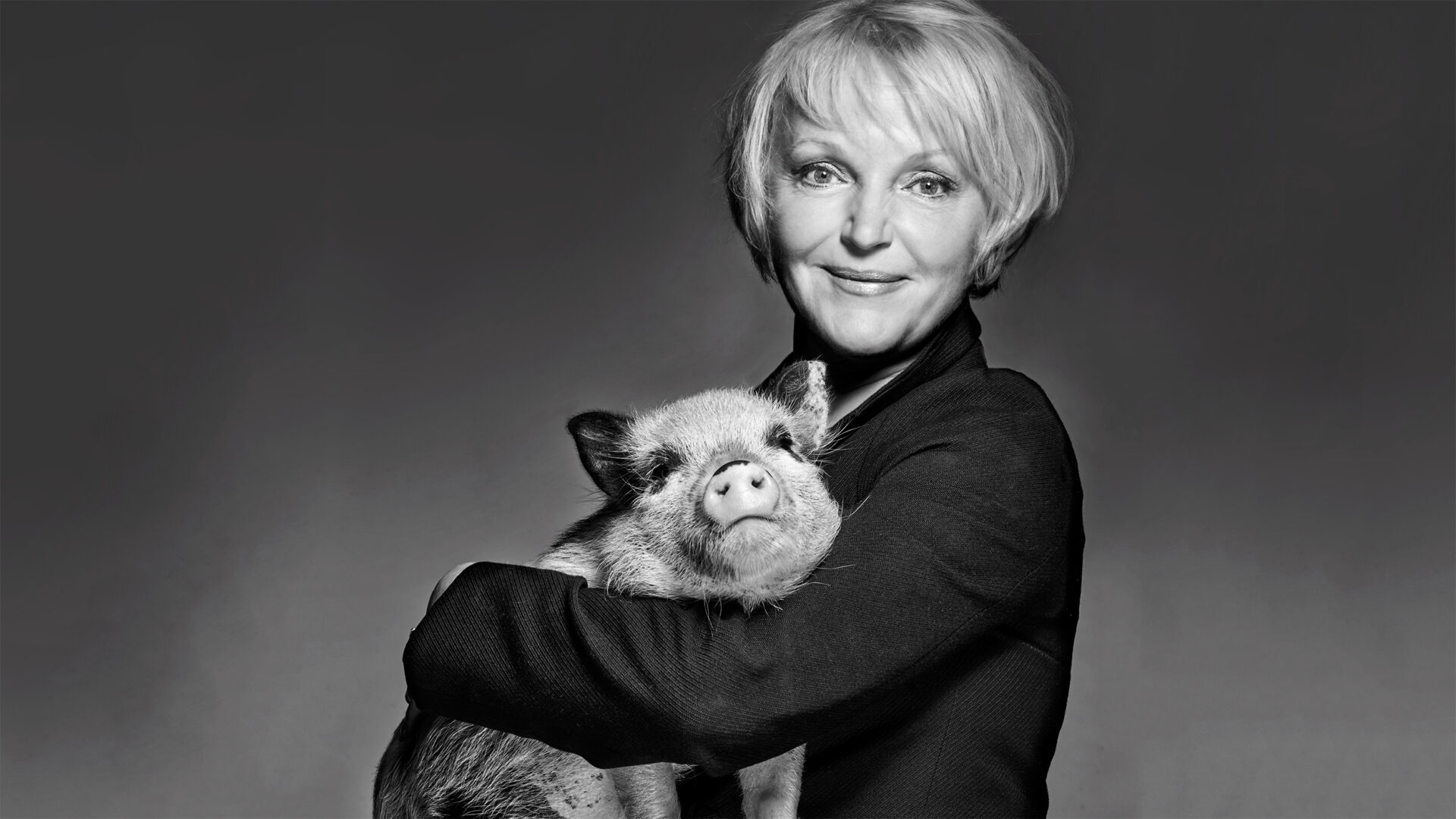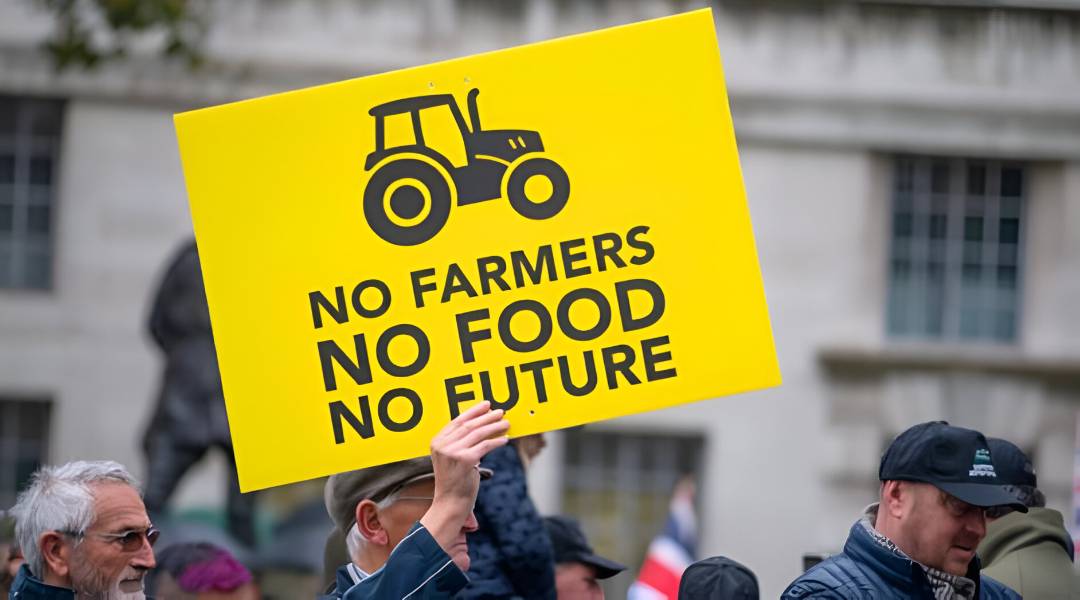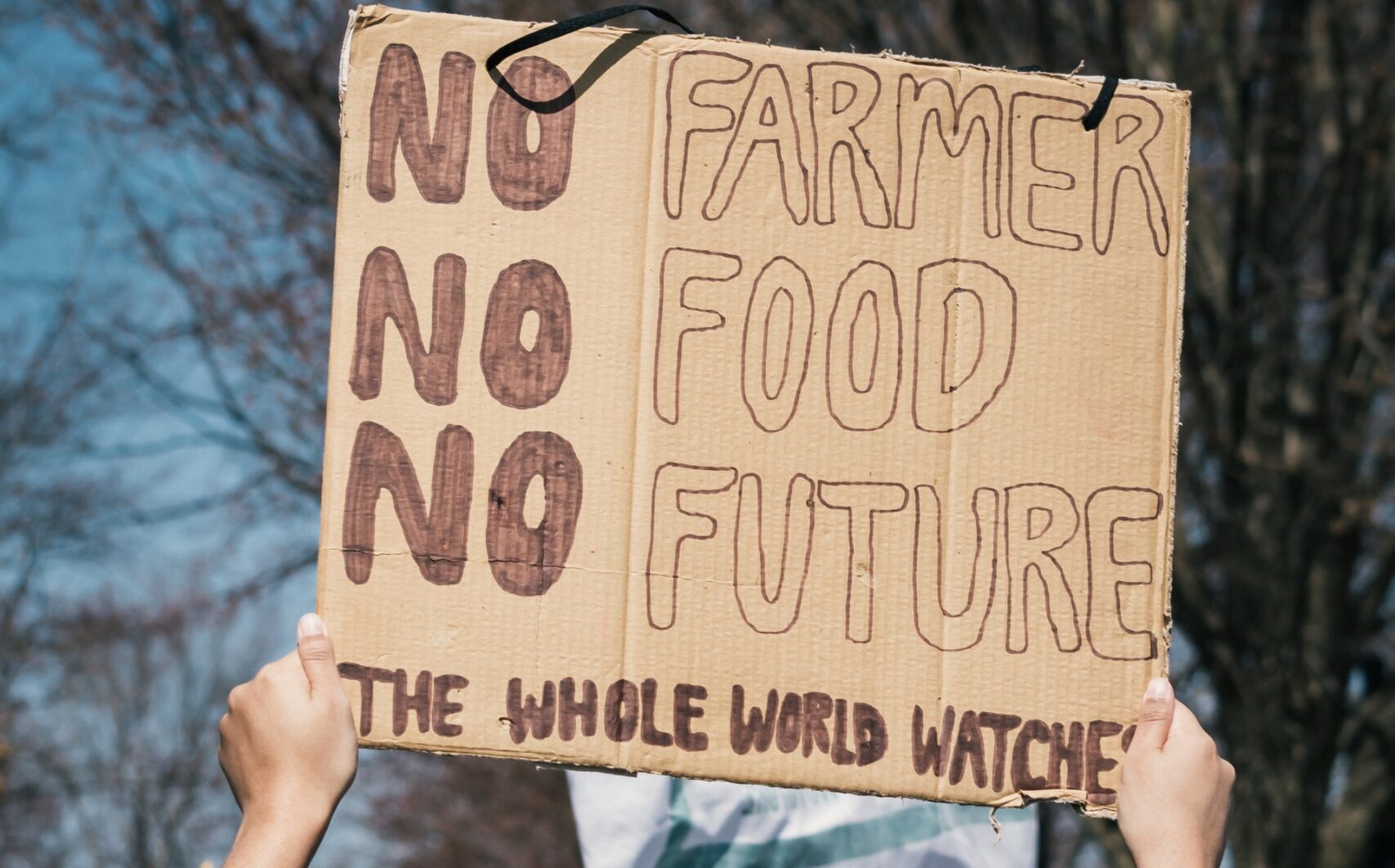? #TurnYourNoseUp
In this video appeal actor Miranda Richardson says, “None of us should find this acceptable… Animal factories only exist because people buy their products. Our shopping choices can make a real difference to our health, the health of the planet and of course the wellbeing of animals.” Our pork labelling guide has information on what different pork labels mean for pigs, helping you to #TurnYourNoseUp at factory farms and make more informed purchases.
? Wrong on climate and wrong on farming
This article in Defender, the media outlet of Robert F Kennedy’s campaign, Children’s Health Defense, exposes the greenwash in Bill Gates’ new book ‘How to Avoid Climate Disaster’ in which Gates boasts of ‘solving’ hunger and food insecurity in Africa by giving ‘poor farmers the financial means to buy (chemical) fertilizers’. But even Gates acknowledges that the process of producing synthetic fertilizers emits ever increasing amounts of nitrous oxide, a greenhouse gas 400 times more damaging than CO2. As a solution, Gates advocates another of the untested and unproven techno-fixes he is becoming known for – this time it’s an experimental project to genetically engineer microbes to fix nitrogen to soil. ‘If these approaches work,’ Gates writes, ‘they’ll dramatically reduce the need for fertilizer and all the emissions it’s responsible for.’ (!!)
‘Proponents say these efforts give farmers the choices they need to boost production and lift themselves out of poverty. Critics argue that Gates’ green revolution strategies are harming Africa by making ecosystems more fragile, putting farmers into debt, and diverting public resources away from deeper systemic changes needed to confront the climate and hunger crises.’
The UN Food and Agriculture Organization expert panel report on agroecology clearly calls for a shift away from the “green revolution” industrial agriculture model and toward agroecological practices that have been shown to increase the diversity of food crops, reduce costs and build climate resilience. But programs to scale up agroecology are starving for funding as billions in aid and subsidies go to prop up industrial agriculture models. Donor preferences for profitability, scalability and short-term results are holding back investments in agroecology, according to a 2020 report from the International Panel of Experts on Sustainable Food Systems (IPES-Food).
? Gates shapes the UN Food Summit
The Alliance for a Green Revolution in Africa (AGRA), funded with $4 billion from the Bill and Melinda Gates and Rockefeller Foundations, aims to increase farm incomes in Africa with bio-tech ‘solutions’ such as genetically modifying cassava to be resistant to disease.
However a Voices From Africa report shows that AGRA was planned without African voices, and imposes a regime in which farmers lose power over their own seeds and are forced to buy them back from large corporations year after year. The Foundation’s plan for Africa involves the production of cash crops which can be sold on the global market. The report calls for local control and food sovereignty as an alternative.
A group of 173 organisations from 83 countries – including Amnesty International, Greenpeace and Friends of the Earth – have written a letter to the UN Secretary General raising concerns that the President of the AGRA, Agnes Kalibata, a former Minister of Agriculture in Rwanda and proponent of artificial fertilisers, is to become the special envoy for the UN Food Summit, 2021.
‘Given the history of AGRA, the appointment of its President to lead, prepare, and design the Summit, will result in another forum that advances the interests of agribusiness at the expense of farmers and our planet.’
‘The role of agribusiness in shaping food systems has been challenged by large sectors of the population across the world and in a steadily increasing body of research: TNCs (transnational companies) and investors profiting from industrial agriculture, fishing and livestock-keeping are responsible for destroying ecosystems; grabbing lands; water and natural resources; undermining the livelihoods of Indigenous Peoples, rural communities; perpetuating exploitative working conditions; creating health problems; and a significant proportion of greenhouse gas (GHG) emissions.’
‘Further, agribusinesses focus primarily on productivity and yields, whereas the notion of food systems makes visible the multi-dimensionality of food, much of which is related to public purpose objectives that cannot be met through corporate interests. Family Farmers produce more than 80% of the world’s food in value terms. They should be at the center of the UN Food Systems Summit, particularly during this UN Decade on Family Farming.’
?? Green Revolution destroyed Indian farmers
If there is any integrity in the motives driving Gates’s philanthopy, he needs to listen to the pleas of the Indian farmers who have suffered the harsh impact of the so-called Green Revolution introduced in the 1950s. This article in the Scientific American, asks whether the farmers’ protests are marking the end of the Green Revolution, which promoted capital-intensive industrial agriculture instead of traditional sustainable village farming.
‘Expensive inputs were paid for by state support but as this declined, so the problem of unremunerative prices and debt escalated. So did ecological crises such as falling groundwater tables, saline and degraded soils, biodiversity loss and health disorders from pesticide use—culminating in a full-blown agrarian crisis by the 1990s and an epidemic of suicides by farmers’.
‘In September 2020, India’s government of Narendra Modi circumvented parliamentary procedures to push through three bills that eased the restrictions on private players in agricultural markets. The move enraged farmers—especially in the northwestern state of Punjab, the epicentre of Green Revolution farming. After protesting in vain for two months, tens of thousands of Punjab farmers began a march to New Delhi in late November.
‘The demonstrations have since spread across the country and represent the largest-ever mobilization of farmers in independent India. They have already claimed over 70 lives; many have died of the cold and some have committed suicide as a political statement. The standoff is not just about the repeal of the three laws, but also includes the demand that the state guarantee minimum support prices (MSPs) for all public and private purchases of produce. In a broader perspective, however, this agitation is writing the obituary of the Green Revolution’.
? Global to local
EU farmers urgently need the protection that Indian farmers are fighting to retain in order to stem the corporate ‘get big or get out of the industry’ motto that forces ever more farmers to pack ever more animals into barbaric conditions and hide the truth behind razor wire fences. The pork industry in Spain has recently won economists’ accolades by becoming the top EU exporter of pork to China, an achievement made possible by cost-cutting, leading to animal abuse and disgusting living conditions for pigs as revealed by Aitor Garmendia’s photography and report. He risked arrest and prosecution, often entering the factory farms covertly at night to expose how these abuses are not isolated incidents but an inherent part of the global competition for ever cheaper meat.
⛓️ Biting bars
The horrors revealed in the photo essay include abused, traumatised mother pigs biting the steel bars of cages so narrow they can’t even turn around, in which they are confined for five weeks in each pregnancy. They do this out of sheer desperation from being unable to express any natural instincts or behaviour, yet the pig industry will callously tell you that the pigs are merely hungry and it can be solved by giving them straw. Pigs kept outdoors on the other hand, are free to roam, root and play, dig in the soil and feel the sun on their backs. In the UK 40% of breeding sows spend their whole life outdoors, more than in any other country, and consumers can support these farms and avoid factory farmed pork by only ever buying pork labelled RSPCA, Outdoor, Free Range or Organic.
?️ Is there any hope?
Three quarters of fattening pigs in the UK are from factory farms, mostly labelled Red Tractor, and will have to compete with cheap imports from even lower welfare factory pig farms in the US unless the government follows the recommendation of the Trade and Agriculture Commission to charge tariffs on imports of food produced to lower standards than are legal in the UK. In the US it is still legal to add antibiotics to pig feed to promote growth. In the EU and UK, although this sub-therapeutic use of antibiotics as a growth promoter is banned, routine use of antibiotics to keep animals alive in overcrowded and unhealthy factory farms is still widespread. Antibiotic-resistant bacterial pathogens and highly contagious zoonotic diseases have already emerged from industrial animal agriculture, outpacing our ability to create new antibiotics or control disease spread. Given these inhumane and unsanitary conditions, it is highly likely that a factory farm-bred disease will, at some point, become the source of another global health crisis.
? Less antibiotics used on organic farms
Thursday’s webinar launched the Save our Antibiotics Alliance new research into antibiotic overuse showcasing the differences in levels of antibiotic use between a sample of Soil Association certified organic farms and the UK national average. Their Director, Suzi Shingler, explains their findings; ‘The data shows that these organic farms are using four times less antibiotics than the UK national average, prompting questions of the role of welfare in the UK’s national antibiotic reduction strategy. As the evidence base grows showing the link between high welfare farming systems and high health/low antibiotic use, the case for the UK continuing business as usual in the face of the critical global health crisis is becoming harder to defend’.
? Toxic food containers and plastic bottles
The power of big business and their lobbyists to pressure governments to put their profits over citizen’s health is huge. So, we must get informed through NGOs like Chemical Watch who are campaigning against one of the most toxic substances Bisphenol A (BPA) that is used as an intermediate in the manufacture of food containers and plastic bottles, and as a non-intermediate, for example in thermal paper for till receipts. PlasticsEurope, one of the leading European trade associations (read corporate lobby), has appealed an EU court ruling that confirmed bisphenol A (BPA) is a Substance of Very High Concern (SVHC) based on its endocrine-disrupting effects on the environment. The latest of a series of legal challenges the trade lobby has mounted against European Chemicals Agency (Echa) about its decisions on the substance is pending an appeal in the European Court of Justice.
It is already banned in the EU for some products, such as baby bottles but in America it is unregulated. Shanna Swan, Ph.D., author of Count Down says endocrine-disrupting chemicals, ‘are causing decreased sperm counts, plunging testosterone levels and rising levels of erectile dysfunction’.
? Gene Technology
European Court of Justice ruled that precision breeding using genome editing is subject to the 2001 EU directive banning genetically modified organisms. However, our neo liberal tories are determined to legalise both, starting with gene editing that they claim mimics natural breeding processes, but with more speed to make crops resistant to pests, disease or extreme weather and to produce healthier, more nutritious food! We should be forewarned by the unfulfilled promises spun by the GMO lobby 25 years ago, when Monsanto, and a few other companies, mounted a massive public relations effort to convince people of their supposed benefits. They claimed it would be the answer to world hunger, a way to help troubled farmers stay on the land, and as a technology that would bring higher quality, more nutritious food to all. Skeptics in many countries responded swiftly and 25 years later an increasing number of countries and people reject genetically modified foods and seeds because of both their failure to live up to the rhetoric and their unintended consequences.
As part of the government’s public relations drive, BBC Radio 4’s Farming Today has been running a gene editing theme all week, linking to the government’s consultation on the Regulation of Genetic Technologies. So far they have interviewed 4 researchers with an interest in the deregulation of gene editing and 1 campaigner raising concerns about the conduct of the consultation. They are now asking for your thoughts to feed into Saturday’s programme.
If you don’t think 4:1 is the kind of balance the BBC should be pursuing, please send your thoughts to farming.today@bbc.co.uk. Ideally include a quotable comment they can read out on the programme.
On the program, Pat Thomas (03/03/21 at 8m 30s), director of Beyond GM in the UK says;
“The government is breaking its own rules that say it shouldn’t be consulting (the public) on issues it has already made up its mind on – the government is minded to deregulate gene editing and now are simply talking about how we are going to do it”.
“What you hear time and time again is gene editing could, might possibly, potentially – and that’s because apart from 2 crops grown in a very limited area for a very limited market in the American Midwest, there aren’t any gene edited crops or animals so there is not enough information for us to understand“.
Experiments are in progress to gene edit pigs’ DNA to be resistant to the respiratory PRRS virus,
“While the goal of reducing PRRS is really important and good, we should be looking at why our pigs are so sick”.
Before 17 March 2021, please take part in the UK Government’s online consultation on the regulation of genetic technologies and, notably, the technique of gene editing. Though consultations are supposed to be easy to understand and answer, this one is very technical and the language unnecessarily complicated. Also, the questions presume that genetic technologies are beneficial, although it provides no supporting evidence – hence the need to correct their presumptions. So, to help answer the questions, the Landworkers’ Alliance has submitted a full response to the consultation – you can cut and paste their answer into each section.
? Solutions; End junk food advertising
Just as corporations promote and profit from the expansion of industrial agriculture through the global roll-out of the Green Revolution, their highly processed junk food is undermining health and wellbeing the world over. A new campaign from the UK NGO, BiteBack wants to end junk food marketing online. The research behind this campaign has found that:
- Young people in Britain are exposed to 15 billion junk food ads a year online.
- 500 junk food ads go out online that are seen by children.
- The 5 most watched children’s YouTube channels have advertised unhealthy branded items more than 1 billion times.
?? Fringe farming
If we want to see a change in the way our food is produced, we should bring our farms closer to urban people. The Fringe Farming Project, promoted by the campaign group Sustain, wants to see:
‘a new wave of market garden enterprises that connect the urban and the rural with growing and trading healthy food closer to markets, generating long-term green jobs and resilient economies, and contributing public goods in the process. The Fringe Farming project is a collaboration with partners across the UK to understand barriers, identify land opportunities and local actions, and develop national policy to enable agroecological farming at the edge of cities as part of a green economic recovery.’
✊ The public object to factory farming
Raising, slaughtering and marketing livestock in the hinterland of our cities under the careful watch of urban people visiting farms could counter the constant bombardment of misleading advertising and misinformation that disguises the true cost of cheap meat. The revolution of conscientious consumers is on the rise; opinion polls show the majority of the Scottish public does not want factory farming. A survey of 2,000 residents in Scotland found that 83% want intensive farming to be banned. In the US a similar survey found that 89% of people are ‘troubled by the impacts of industrial animal agriculture, citing animal welfare, worker safety or public health risks as areas of concern and that:
‘72% of those surveyed who recently heard about animal welfare, worker safety or public health issues related to industrial factory farming reported seeking out alternatives to factory-farmed meat, eggs and dairy since the start of the pandemic—either buying more from local farms, shifting to products with more assurance of animal welfare or consuming less meat, eggs or dairy.’
If you’re a farmer or someone with a passion for the planet, then this free virtual 4 day Soil Regen Summit 2021 – 15th to 18th March event is for you! They’ll be covering a diversity of subjects like holistic grazing, agroforestry, soil biology, market gardening, mycology, carbon sequestration, human health, ecology and so much more!
Forgive me for pointing out that, while we receive some one-off donations, I am funding Farms Not Factories myself, and if we are to continue to fight the cruel, antibiotic-led factory farm system, we will need some regular donations from like-minded people. Please consider a monthly subscription of £2/month and help us support a network of smaller scale, humane and healthy UK pig farms, local abattoirs and butchers.
Contents
Share This Article
Related ArticlesView All
Protectionism vs So-Called Free Trade
The purpose of our newsletter is to give you important information that is censored in the mainstream media. “The way… Read More
Find A Farmer
The purpose of our newsletter is to give you important information that is censored in the mainstream media. “The way… Read More
Zionist Money Rules
The purpose of our newsletter is to give you important information that is censored in the mainstream media. “The way… Read More
The Price of Progress
The purpose of my newsletter is to give you important information that is censored in the mainstream media. “The way… Read More
Silencing Dissent Through Fear
The purpose of my newsletter is to give you important information that is censored in the mainstream media. If you… Read More
Ukraine and Israel – A United Force
The purpose of my newsletter is to give you important information that is censored in the mainstream media. If you… Read More






